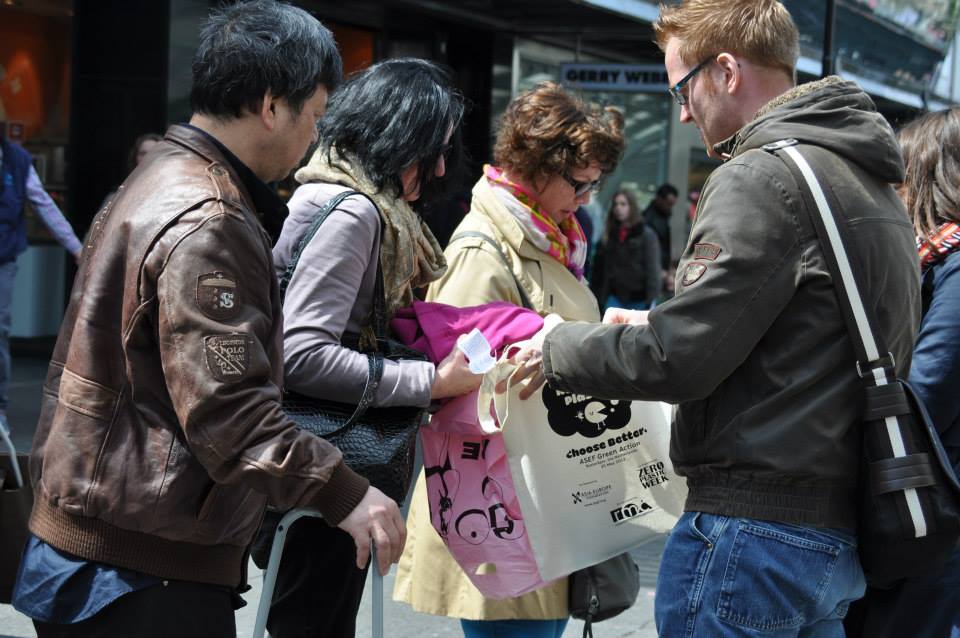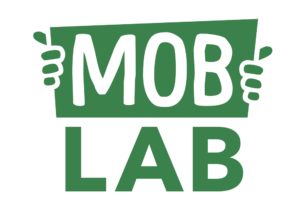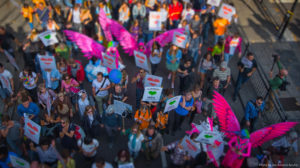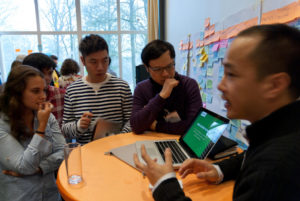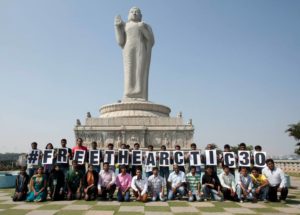A Zero Plastic Week participant finally found a place to buy French fries in a paper container, but was given a plastic fork in her mayonnaise. Another participant asked a butcher to put meat in the container he brought, and then saw the butcher put on plastic gloves.
Ries Mentink, one of Zero Plastic Week’s co-founders based in the Netherlands, says there were many stories like these shared on the event’s Facebook page as people took up the challenge to go seven days plastic-free.
Participants were open in sharing their stories, including the failures. One particularly inspiring blogger took part in Zero Plastic Week 2012 and decided to continue throughout the year, to the point now that he is almost waste-free, notes Ries.
Zero Plastic Week, an event following World Oceans Day in June, was formed through the work of five Greenpeace volunteers involved in a traineeship project. After a successful inaugural Netherlands-based event in 2012, this year’s Zero Plastic Week sprung into an international event with 12 countries and hundreds of people engaged.
The Impetus
The five Greenpeace volunteers took a four-month traineeship project through Improve the World, a Netherlands organization. The group was tasked to put together a project that had calculable outcomes and an environmental background.
Through brainstorming, Ries says the group talked about “plastic soup,” the trash vortex in the North Pacific Ocean, and their frustration with the overall lack in awareness of the problem. The gyre of marine debris floating in the ocean has been estimated to be an area 34 times the size of the Netherlands.
With products having more needless packaging, especially around food, the group came up with the idea to have people stop using so much useless plastic and become aware of the easy alternatives. The challenge, to go a week without buying plastic, brings to light how hard it can be to avoid buying products with plastic and how addicted people have become to the man-made convenience.
“It was a project that we were all really passionate about and threw a lot of time and energy into it,” Ries says. There were 1,498 official participants.
“The results were so overwhelming to us; so many people picked it up. We expected people to participate but we never expected people so actively to participate,” he says.
The participants were so engaged that the organizers didn’t have to do much, says Ries.
People were blogging about the week and sharing tips and tricks for avoiding plastic via newsletters and social media. The media picked up the story, with national coverage on the front page of one of the largest newspapers in the Netherlands as well as on TV and radio. There was so much media attention that some interviews had to be turned down because there wasn’t enough capacity, recalls Ries.
“That was really overwhelming and inspiring,” says Ries, noting it showed people take a hold of a simple yet challenging task they can do to help mitigate problems.
Building a Movement
Given the success of the week in 2012, Ries says the organizing team knew they needed to do something to build on it.
He says they didn’t have much of a network and turned to Greenpeace Netherlands who sent out a call through the mobilisation network for people to become ambassadors. The message was picked by many Greenpeace volunteers and some staff, who took on organizing events in their respective areas.
Key Takeaways
• When creating a new event, consider how it can be built and scaled for future years
• Being on the streets is an effective way to spread the word about an inaugural event
• Encouraging ambassadors to take ownership over their events can bring unique ideas and engagement
• Promoting events through playing with local culture can bring some fun to a serious topic
• Providing more opportunities for volunteers to get involved may lead to more energy
Twelve countries, representing seven languages, signed on “within no time,” says Ries. The participating countries were Belgium, Canada, Curacao, Germany, Luxembourg, Mexico, Netherlands, Russia, Schweiz, South Africa, Turkey and USA.
The organizing group divided up the tasks. Ries took on getting the ambassadors started through a couple of events providing them with the tools, motivation, and a forum to ask questions.
Ambassadors were not told what to do but were given tools, background information, photos and support with the encouragement to make it their own event.
“It was really inspiring because people picked it up so well and once again took responsibility, took ownership, and got it started in their own countries, which was awesome,” he says.
Mobilising From the Streets to Online
In 2012, the best mobilisation tool was going out into the streets with Zero Plastic Week and signing people up, says Ries. Volunteers shared about the event at festivals, markets, and on the street.
One of the events was hosting a free soup stand, with a large pot of water and plastic. Given the culture among Dutch people, whom are known for their love of free things, people came and lined up for the free plastic soup. People were very receptive to the message and the event “gave a laugh to a very serious matter,” says Ries. The event was a way to inform people about Zero Plastic Week and sign them up as participants.
Participants in the week were tasked with deciding what their own boundaries are, notes Ries. For example, some may challenge themselves to go completely plastic-free, while others may decide reusing plastic they already have or using a plastic fork is acceptable.
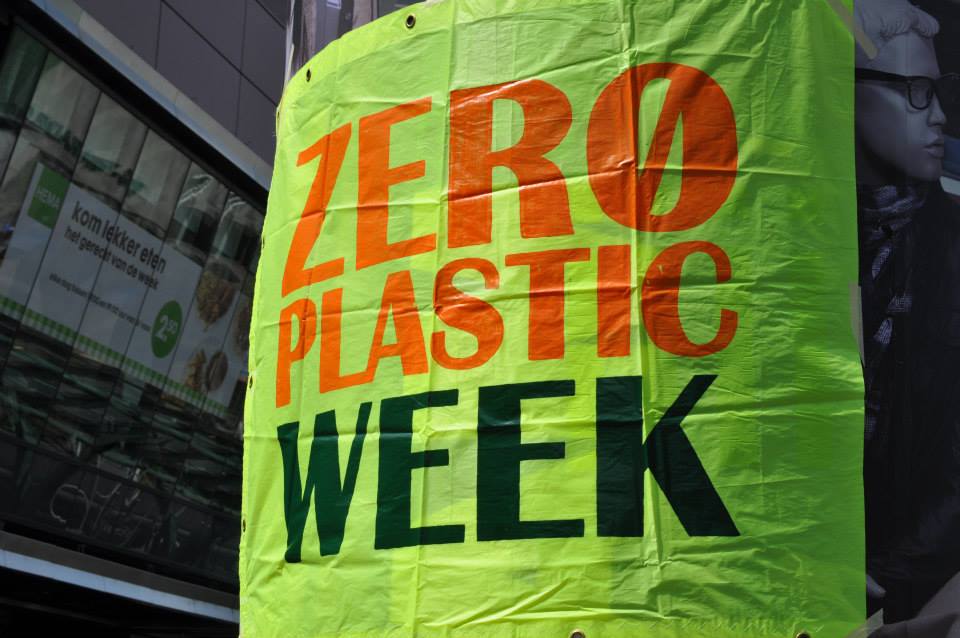
Street advertising for the event.
With an existing base of previous participants, Ries says there were more online mobilisation tools used in 2013. A video was posted online showcasing the 2012 event and pictures with catchy phrases were shared via social media. Articles in newsletters also spread the word, as well as media attention.
Several Zero Plastic Week Facebook pages were created, either by country or language.
Events Engage the Public
Zero Plastic Week 2013 was held June 10-17, and had 2,618 official participants signed up through the website and e-newsletter. Ries notes this is a rough number, as many families were involved. There were more than 100 volunteers worldwide.
Various events were held to highlight the initiative. In Santa Cruz, California, a plastic parade showcased plastic bag monsters made from plastic gathered on the beach that day. An open-air film screening in Switzerland showed the film Bag It, which focuses on plastic usage in our lives. A reggae band in Russia planned to write a song about plastic, while in Africa a workshop was held on how to recycle plastics in the form of t-shirts.
In the Netherlands, several environmental organizations formed a Zero Plastic Market to provide information to the public about their work. An outdoor bag exchange was held where people were offered free, organic cotton bags in exchange for their plastic shopping bags. The plastic bags collected are going into a Plastic Will art project aimed to create awareness about the problems that come with waste in waters.
What’s Next
Over the next few years, Ries says the focus is on building a movement and increasing awareness that there are alternatives for people to avoid plastic wrapping and packaging.
“I personally hope that we, as people, become aware of the impact that our daily lives have and the choices that we make,” says Ries.
He hopes to see Zero Plastic Week grow to an annual, global event where people anticipate it happening, similar to the recognition around Earth Hour. Ries says he’d like to see the overuse of plastic on the political agenda and be able to push plastic producers to look for alternatives and reduce the amount used.
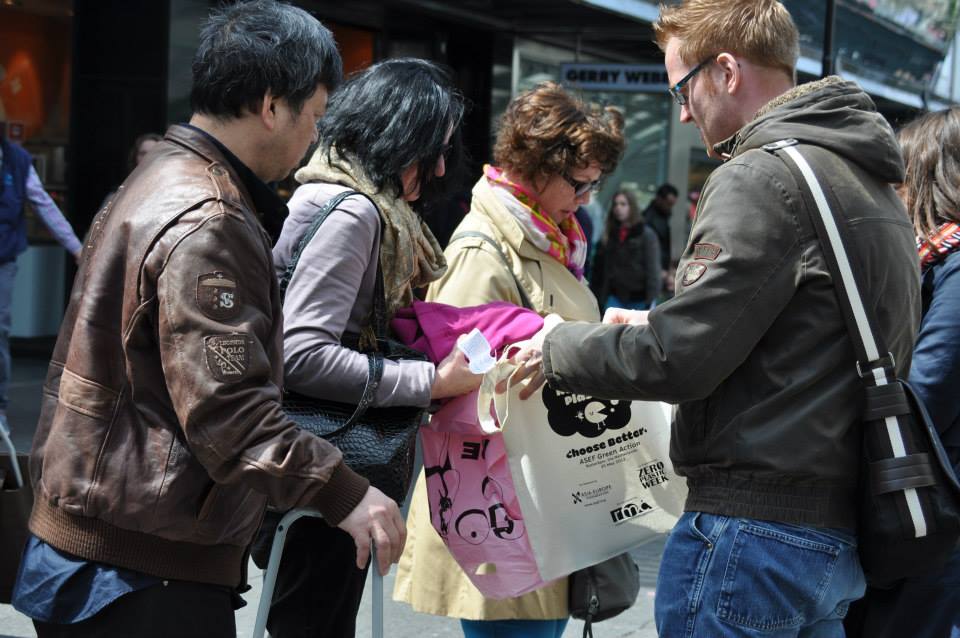
A photo on Zero Plastic Week’s main Facebook page encourages people to look towards the 2014 event.
There are examples showing the reduction of plastic is possible, such as the decreasing use of plastic shopping bags, notes Ries.
The organizing team is looking to make some fundamental changes in how it operates. With the event created through the traineeship program, the organizing team did everything together. Even when the co-founders tried to separate tasks more this year, their passion for the event ended up with some overlap.
For next year, the organizers will aim to separate tasks more and call out to volunteers for help, who have been “overwhelming” in their response. Ries says he anticipates giving more people the opportunity to be involved will make things more interesting, energetic and productive.
Stay Connected: @ZeroPlasticWeek
Related Posts:
Countless Lessons from Zero Plastic: How Dutch volunteers mobilised support
Volunteer makes disappearing bees international issue
Do you have an innovation in mobilisation and people-powered campaigns? Share it with Mob Lab by contacting moblab@greenpeace.org.
Top photo: On May 25 in Rotterdam a bag exchange was held where people were offered free, organic cotton bags in exchange for their plastic shopping bags. The plastic bags collected are going into a Plastic Will art project aimed to create awareness about the problems that come with waste in waters.
